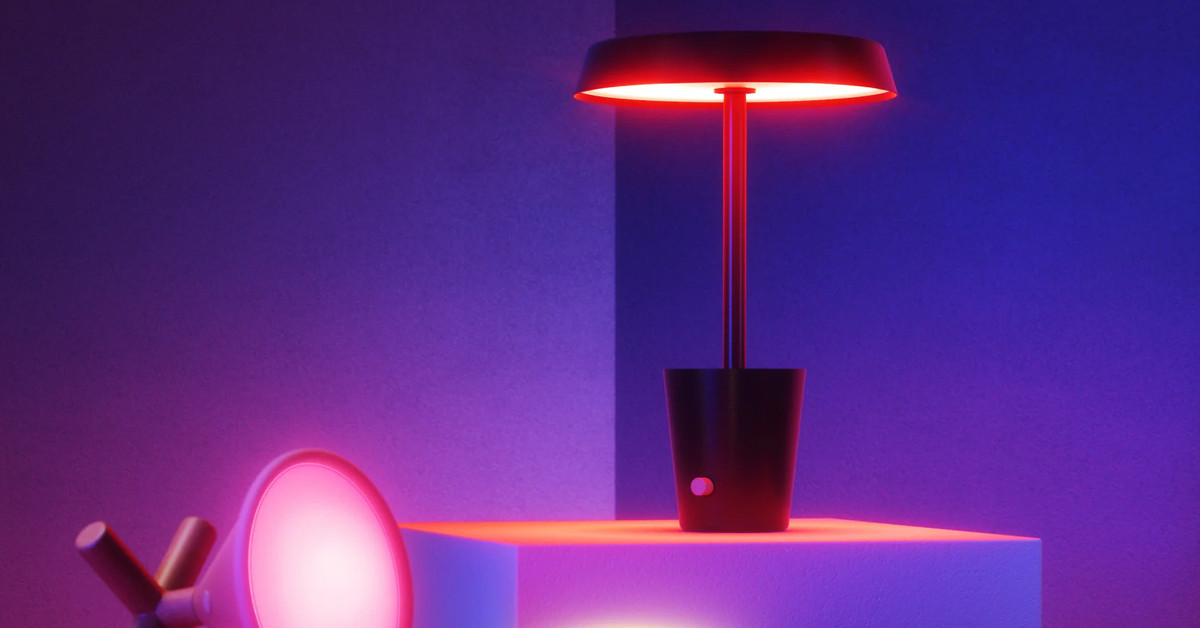The dust has settled on IFA 2023, Europe’s biggest tech trade show, held annually in Berlin, Germany. The Verge was on the ground at the show, which ran from September 1st to 5th, covering all the big news and gadget launches. But now that I’m back stateside, I wanted to call out a few more fun gadgets and intriguing pieces of tech I saw on the show floor (or thereabouts).
In case you missed it, I’ve already written about SwitchBot’s cool new twist on a robot vacuum mop that can fill its own water tanks, got some hands-on time with Philips Hue’s pricey but pretty new smart security camera system, and listened to Alexa and Google play nicely in a new smart speaker from JBL. So, in no particular order, here are a few more gadgets from the show that caught my eye.
a:hover]:text-gray-63 [&>a:hover]:shadow-underline-black dark:[&>a:hover]:text-gray-bd dark:[&>a:hover]:shadow-underline-gray [&>a]:shadow-underline-gray-63 dark:[&>a]:text-gray-bd dark:[&>a]:shadow-underline-gray”>Photo by Jennifer Pattison Tuohy / The Verge
a:hover]:text-gray-63 [&>a:hover]:shadow-underline-black dark:[&>a:hover]:text-gray-bd dark:[&>a:hover]:shadow-underline-gray [&>a]:shadow-underline-gray-63 dark:[&>a]:text-gray-bd dark:[&>a]:shadow-underline-gray”>Photo by Jennifer Pattison Tuohy / The Verge
Canadian design firm Umbra partnered with Nanoleaf on two cool new smart lamps. The $95 Cono is a battery-powered portable lamp with an X-shaped stand; the $130 Cup is a wired desk lamp with built-in storage for pencils and other desktop knickknacks. Both are Matter-compatible (via Thread) and can also be controlled over Bluetooth with Nanoleaf’s app. The lamps should be available in mid-October on ca.umbra.com. I am definitely eyeing that desk organizer for my home office.
a:hover]:text-gray-63 [&>a:hover]:shadow-underline-black dark:[&>a:hover]:text-gray-bd dark:[&>a:hover]:shadow-underline-gray [&>a]:shadow-underline-gray-63 dark:[&>a]:text-gray-bd dark:[&>a]:shadow-underline-gray”>Photo by Jennifer Pattison Tuohy / The Verge
a:hover]:text-gray-63 [&>a:hover]:shadow-underline-black dark:[&>a:hover]:text-gray-bd dark:[&>a:hover]:shadow-underline-gray [&>a]:shadow-underline-gray-63 dark:[&>a]:text-gray-bd dark:[&>a]:shadow-underline-gray”>Photo by Jennifer Pattison Tuohy / The Verge
I love how sensors can make your smart home so much smarter. They let you turn your lights on when you walk in a room or turn your heating off when you leave the window open — but I don’t like having white plastic dongles stuck on my walls, doors, and windows.
The eHandle ConnectSense is a handle for European-style windows that solves this with a built-in Z-Wave sensor. It can detect vibration and your window’s open / closed or tilt position, letting you set up automations galore without the eye sores. It’s EU-only for now, but I can dream!
a:hover]:text-gray-63 [&>a:hover]:shadow-underline-black dark:[&>a:hover]:text-gray-bd dark:[&>a:hover]:shadow-underline-gray [&>a]:shadow-underline-gray-63 dark:[&>a]:text-gray-bd dark:[&>a]:shadow-underline-gray”>Image: Yeelight
a:hover]:text-gray-63 [&>a:hover]:shadow-underline-black dark:[&>a:hover]:text-gray-bd dark:[&>a:hover]:shadow-underline-gray [&>a]:shadow-underline-gray-63 dark:[&>a]:text-gray-bd dark:[&>a]:shadow-underline-gray”>Photo by Jennifer Pattison Tuohy / The Verge
While we’re still waiting on the Skylight light panels that Nanoleaf announced at CES (and which I glimpsed at IFA), smart lighting company Yeelight showed off the Yeelight Pro P20 Rooflight. This very realistic-looking roof light mimics the effect of a skylight using nanotechnology-enabled “Rayleigh Scattering.” It’s not a DIY installation, unfortunately, since it needs to be mounted in your ceiling, but it will work with Matter like the rest of Yeelight’s Pro and Fun lighting ranges.
Speaking of ceiling lights and Matter, I did get to see Aqara’s T1M ceiling light in person. A trade show floor with 50-foot high ceilings is not the place to show off a light intended to be mounted on a ceiling, but this RGB gradient-capable smart light still looked quite attractive in person. Unfortunately, I couldn’t see it changing colors — Aqara blamed the convention center Wi-Fi for that.
a:hover]:text-gray-63 [&>a:hover]:shadow-underline-black dark:[&>a:hover]:text-gray-bd dark:[&>a:hover]:shadow-underline-gray [&>a]:shadow-underline-gray-63 dark:[&>a]:text-gray-bd dark:[&>a]:shadow-underline-gray”>Photo by Jennifer Pattison Tuohy / The Verge
a:hover]:text-gray-63 [&>a:hover]:shadow-underline-black dark:[&>a:hover]:text-gray-bd dark:[&>a:hover]:shadow-underline-gray [&>a]:shadow-underline-gray-63 dark:[&>a]:text-gray-bd dark:[&>a]:shadow-underline-gray”>Photo by Jennifer Pattison Tuohy / The Verge
I also got my hands on Aqara’s new Smart Lock U200, the company’s first designed for European-style mortise doors (it will be available in the US if, you know, you have a fancy door).
A retrofit lock, the U200 attaches with screws or 3M tape, so no drilling is needed. It has all the ways to unlock you might want: fingerprint, keycode, and NFC through the keypad (which sits separately from the lock and is connected over BLE). The lock is battery-powered, and the keypad can be either hardwired or battery-powered.
Unlike Aqara’s U100 lock, which uses Zigbee, the U200 uses Thread, so it doesn’t connect to an Aqara hub. This means the Aqara app can’t control it remotely; you have to sync it with a compatible smart home platform. It works with all the big players both directly and through Matter — including Google Home, Apple Home, Amazon Alexa, and SmartThings. There’s no HomeKey compatibility, but Aqara told me they are working on it. The lock will launch on Kickstarter later this year.
Aqara also showed off one of the first Matter-compatible in-wall outlets (i.e., not a smart plug but a wired outlet); this one is also EU-only.
a:hover]:text-gray-63 [&>a:hover]:shadow-underline-black dark:[&>a:hover]:text-gray-bd dark:[&>a:hover]:shadow-underline-gray [&>a]:shadow-underline-gray-63 dark:[&>a]:text-gray-bd dark:[&>a]:shadow-underline-gray”>Photo by Jennifer Pattison Tuohy / The Verge
Home energy management was a big theme across the show floor. But European smart home company Tado had the most intriguing releases: a free Smart Charging app designed to save electric car owners as much as €300 annually on their charging costs and one of the first smart heat pump controllers.
The EV charging app works with variable rate tariffs to dynamically adjust fueling your vehicle based on the price of electricity. What’s ingenious here is that it doesn’t require any “smart” equipment. It works by connecting your car’s software to the app and is compatible with almost every make and model of EV available (some models do need a smart wallbox).
Making it easier to manage energy use is a key role for the smart home, and Tapo is leading the way here — at least in Europe. The company also launched the Tado Heat Pump Connector (€299), which gives you granular control over how and when your heat pump runs to take advantage of dynamic tariffs and reduce costs by up to 27 percent, according to Tado. Neither product is getting a US release; instead, they’ll be available in Germany, Austria, Switzerland, the UK, the Netherlands, France, Italy, and Spain.


